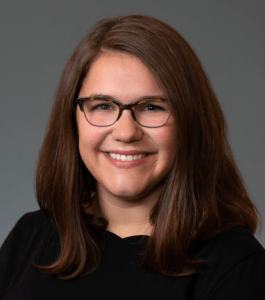Rachel Linsner HD ‘13, MS is currently a Doctoral Research Fellow at the Institute for Veterans and Military Families and a Ph.D. candidate in the Department of Human Development and Family Science at Syracuse University. As a dedicated researcher interested in military families, child and family policies, family processes and child outcomes, trauma, and family/parenting stress, Rachel shared some of her thoughts with us on September 27th.
How have your values, goals, and missions shaped what you’re doing now?
Coming from Human Ecology, I felt motivated to use research to be helping people. Whether that’s through policy, or whether that’s through programs, [this goal has led me] to be always thinking about what are families’ experiences. What do families need? What’s working for them or not? That focus on doing good and improving peoples’ lives for me is a really important thing.
What are some differences between undergraduate and graduate school?
When I came to Cornell I thought I had hit the jackpot because I was finally with so many people that loved learning in the way that I did. When I got to grad school, that was amplified–people are taking an additional step to keep talking about these issues that are of interest to them!
A difference is how closely I work with my advisor in graduate school. Picking that person or them picking you is such a crucial part of your graduate school career. I took the call outside of Day Hall from [my advisor] when I was in the interview process and I asked him how he would describe himself as an advisor. He said “committed” and that’s exactly what he’s been. Even when my progress has slowed or I haven’t been as dedicated to my dissertation as I should be, he’s been so committed to my success. Your advisor in undergrad is a really important person, but in graduate student that person is critical to your success and your experience of graduate school.
Other differences are that It’s a bit more isolating in graduate school–you don’t live with other students. The expectations are different–you’re usually a Research Assistant or Teaching Assistant in addition to your coursework. Depending on what you’re pursuing, you might be in a lab working as a team or you might be working more on your own.
What advice would you give to students preparing to graduate?
Become more comfortable with uncertainty and be okay with not knowing exactly what your 5 year plan is. Take advantage of the opportunities that are available to you or might come across your plate. You’ve already accomplished a lot and now that you will accomplish getting a degree from Cornell, the world is your oyster. Human Ecology has given you the skills and knowledge to prepare you for that next step!
We thank Rachel for visiting Human Ecology and wish her the best in all her endeavors!

